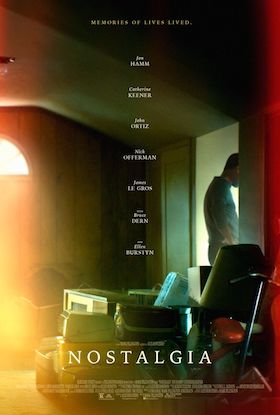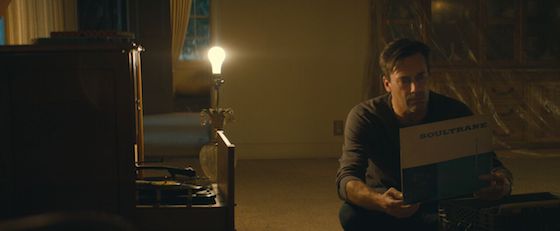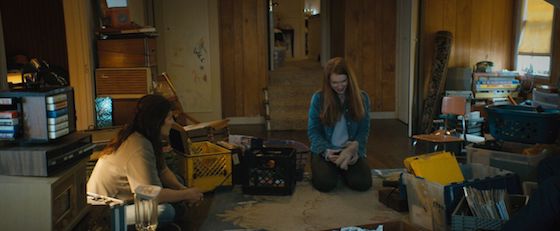
 [Rating: Swiss Fist]
[Rating: Swiss Fist]
Nostalgia is a relentlessly introspective movie that plays just one note in varying degrees of pitch, from just off- to barely on-key. Consumed top to bottom about notions of identity, place, and the physically inanimate, the movie uses a relay narrative device to circle tightly around these interconnected themes.
At its core, Nostalgia is about the things that people hold onto in life: the objects that give form and meaning to one’s personal journey. The conflict that does exist in this film seems to originate from a question of worth, and whether the possessions in a person’s life weigh them down more than they give them support or purpose. Challenging and interesting questions, to be sure, yet Nostalgia never comes anywhere near an answer to these provocative inquiries, and seems happy to fall back on scene after scene of lofty pontifications that probe rather than penetrate.
The film opens with an insurance assessor named Daniel (John Ortiz) touring the house of a widower, Ronnie (Bruce Dern). Ronnie knows that his collection of old books and furniture isn’t worth much, and that his daughter is eager for him to get rid of most of it so that she won’t have to after his passing, yet the old man is dug in. After all, Ronnie has lived with all his possessions this long, so why not a little longer? Daniel is kind and compassionate, here, just as he is when he goes to his next appointment, where he tours the recently burned down house of a widow named Helen (Ellen Burstyn).
Unlike Ronnie, who is surrounded on all sides by his memories, Helen has only a charred pile of rubble to show for her life. She laments that in her one moment of clarity during the ordeal, when she had to choose just one thing to save from the fire, she picked an old baseball long-cherished by her husband. It means little to her, except as a reminder that she once loved a man who loved this thing, yet this meditation on objective value leads her down an introspective rabbit hole. The narrative baton is passed at this point from Daniel to Helen, the latter of whom travels to Las Vegas to meet with a sports memorabilia dealer (Jon Hamm) who is interested in her husband’s ball.
Nostalgia proceeds thus, with each person getting a long monologue about their experience with objects, what they mean to him/her, before moving to the next character’s portion, which explores a different facet of a grieving process and how that connects to physical things. Although the ideas and themes that the film plays with are interesting and true to life, they are arranged with such a heavy and deliberate hand that there isn’t much room for interpretation or audience reflection. The characters vocalize everything that they feel, only to shift to new characters that also spend huge chunks of time in monologue exploring these same notions from an adjacent perspective.
It’s a lot to absorb, and Nostalgia asks its audience to keep soaking it up over and over and over again. Veteran director Mark Pellington does a good job framing his scenes so that he gets the most out of each moment (objects rooted in memory are almost always in-frame), yet the whole effort feels circuitous. The third act introduces a tragedy in real-time that forces a handful of characters to confront the value of a person versus a thing, yet it again returns to the central theme of what people leave behind, and how survivors grapple with the trauma of memory vis a vis physical objects.
The end result is a somewhat heavy-handed exploration of just one theme, which is presented by a stellar cast of outstanding actors that are all putting their collective backs into this thing. Yet even they can’t sell this assembled collection of self-important, thousand-yard-stare monologues as anything more than a sophomoric meditation on the fleeting nature of existence. And that’s a shame, because Nostalgia seems to know that it has interesting ideas at play, even if it doesn’t know how to get them out of the ground for harvest. For example, what is important when looking to preserve a legacy through an object? Is it that which is monetarily valuable (thus providing some real, actionable worth following a passing), or does it all boil down to a connection to one’s humanity, such as an old letter or photo?
Ultimately, if Nostalgia really is an examination of whether the objects in our lives weigh us down more than they buttress us, the script’s refusal to answer that question is maybe its most admirable feature (as well as its central failing). Spoon-feeding the audience a concrete answer on such a complex topic would be disingenuous, yet at the same time, skirting this issue doesn’t help with the overall effort. To peel off the scab of this topic without confronting it feels exploitative in a way, like a person approaching the ledge of something without jumping off to prove that they don’t fear heights.
Nostalgia is bold for wading into this difficult, emotionally sensitive territory, yet doing so without any real takeaways only exposes the effort’s critical flaw: that it is all questions and no answers. Opening Friday at Tivoli Cinemas, Nostalgia should be commended for attempting to tackle these themes, yet it is hard not to pine for what might have been had this movie planted its flag somewhere rather than just marched it around.







Comments on this entry are closed.